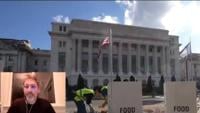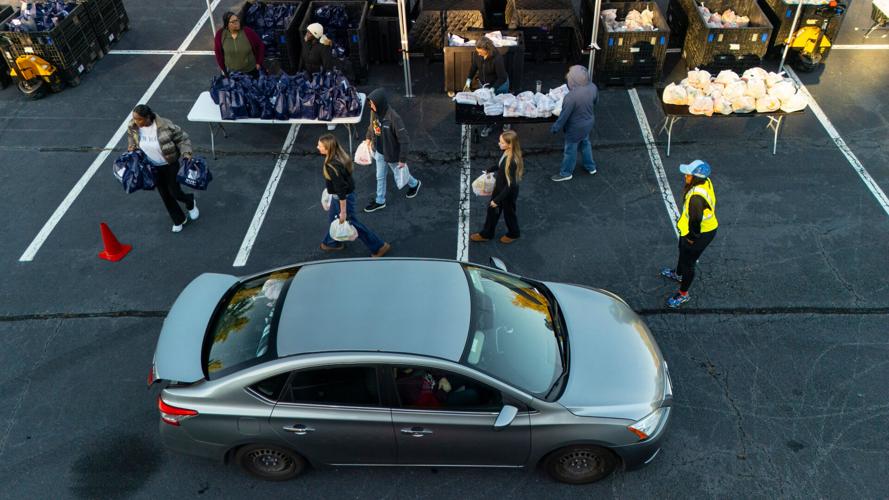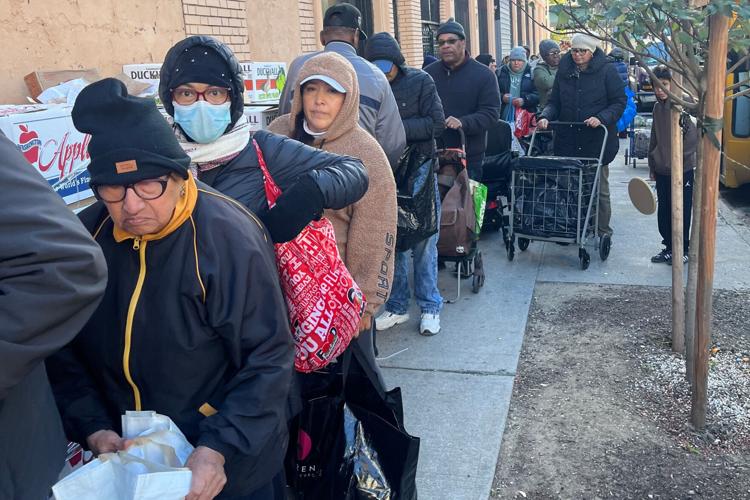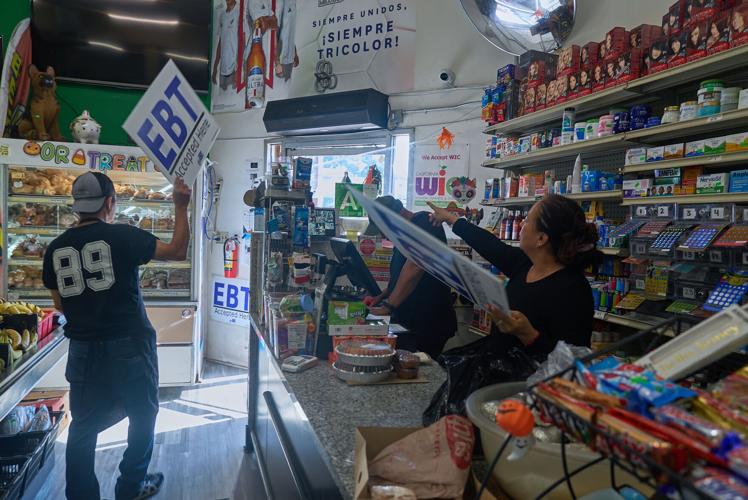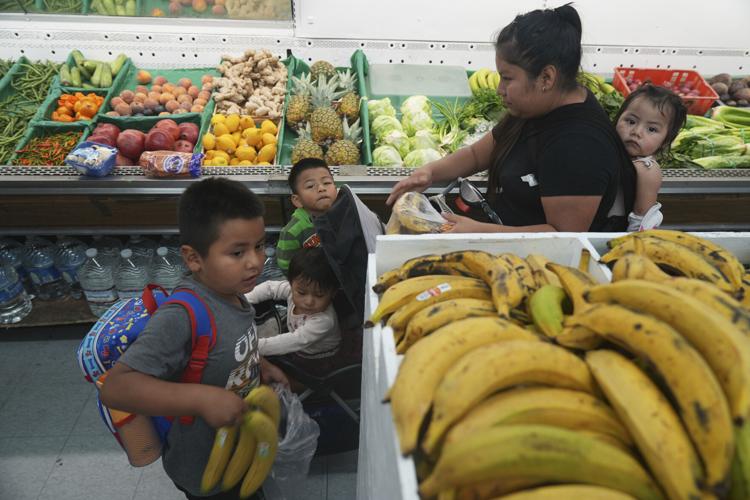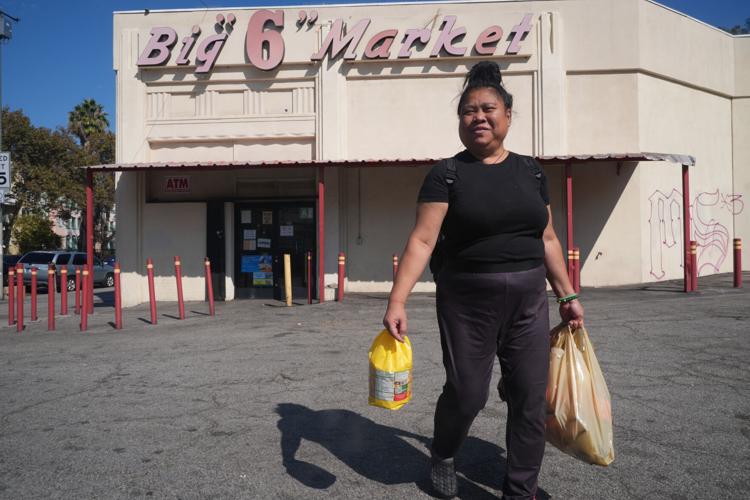WASHINGTON — The second-longest shutdown in history entered its second month Saturday, with lawmakers away from Capitol Hill and both major parties entrenched in their positions. Meanwhile, the federal food assistance program faced delays and millions of Americans were set to see a dramatic rise in their health insurance bills.
The Trump administration's plans to freeze payments to Supplemental Nutrition Assistance Program were halted by federal judges, but the delay in payouts still likely will leave millions of people short on their grocery bills. It was unclear when the debit cards that beneficiaries use could be reloaded after the rulings, sparking fear and confusion among many recipients.Â
People across the United States formed long lines for free meals and groceries at food pantries and drive-thru giveaways Saturday, after their SNAP benefits were suddenly cut off.Â
People are also reading…

Must Ministries delivers food to the public via a drive-thru service Saturday in Austell, Ga.
In Austell, Georgia, people in hundreds of cars in drive-thru lanes picked up nonperishable and perishable bags of food. Must Ministries said it handed out food to about 1,000 people, more than a typical bimonthly food delivery. Families in line said they worried about not getting SNAP benefits in time for Thanksgiving.
It all added to the strain on the country, with a month of missed paychecks for federal workers and growing air travel delays.
"This is more than a crisis," said the Rev. John Udo-Okon, who runs the Word of Life Christian Fellowship International food pantry in New York City's Bronx borough, where about 200 more people than usual lined up early as 4 a.m. Saturday to collect groceries. "Right now, you can see the desperation, you can feel the frustration that the people are going through."

People wait in line for free food Saturday at the World of Life Christian Fellowship International food pantry in the Bronx borough of New York.
Delays and uncertainty around SNAP
The Department of Agriculture planned to withhold payments to the food program starting Saturday, but two federal judges ordered the administration to make them. President Donald Trump said he would provide the money but wanted more legal direction from the court.
In apparent response, U.S. District Judge John J. McConnell in Rhode Island ordered the government Saturday to tell the court by Monday how it would fund SNAP accounts. McConnell, who was nominated by President Barack Obama, said the Trump administration needed to either make a full payment by Monday, or if it decides to only tap $3 billion in a contingency fund, figure out how to do that by Wednesday.
That still leaves uncertainty about whether the department will only provide partial benefits for the month. The SNAP program serves about 1 in 8 Americans and costs about $8 billion per month.

El Recuerdo Market manager Cecilia Benitez, right, sets up banners Friday that read "EBT (Electronic Benefit Transfer) Accepted Here" in Los Angeles, after two federal judges ordered President Donald Trump's administration to continue funding the Supplemental Nutrition Assistance Program during the government shutdown.
Benefits already faced delays, as it takes a week or more to load SNAP cards in many states. Some governors and mayors stepped in, using what money they have available to fill the program that feeds about 42 million Americans.
"People are just nervous, scared," said Jill Corbin, the director of the St. Vincent De Paul soup kitchen and food pantry in Norwich, Connecticut. "It's not really a definite answer that we have right now."
As people lined up early Saturday for hot meals and groceries, the organization had 10 extra volunteers to help newcomers navigate the process. On Wednesday, about 400 families visited the food pantry and 555 people received hot meals.
As the US government ends its Supplemental Nutrition Assistance Program (SNAP), food pantries in New York prepare for a surge in need as families and seniors struggle to afford groceries.
T.J. McCuin, whose family owns and operates farmers markets in Arizona, said 15% of the markets' customers use SNAP benefits. "Hopefully this isn't a long-term problem," he said, "because once those benefits run out, then it's going to start to hurt."
The House has not met for legislative business in more than six weeks, while Senate Majority Leader John Thune, R-S.D., closed his chamber for the weekend after bipartisan talks failed to achieve significant progress.
House Democratic leader Hakeem Jeffries of New York criticized Trump for spending Saturday at one of his Florida golf courses, saying on social media that "Trump and Republicans are illegally withholding SNAP benefits."
"Millions of children could go hungry," he added.

An immigrant mother from Guatemala purchases fresh fruits for her children Friday in Los Angeles with the balance left on her California EBT card used for SNAP benefits.
Democrats demanded that the government fund SNAP, but Republicans argued the program is in such a dire situation because Democrats repeatedly voted against a short-term government funding bill.
"We are now reaching a breaking point thanks to Democrats voting no on government funding, now 14 different times," House Speaker Mike Johnson, R-La., said at a news conference Friday.
The prolonged government shutdown in the United States has deepened nationwide hardships as delayed food assistance, rising health insurance costs, and stalled political negotiations leave millions of Americans struggling to meet basic needs. FRANCE 24 speaks to Aaron Czyzewski, director of advocacy and public policy at Food Lifeline, to get a better grasp of the situation.
Health care subsidies expiring
The annual sign-up period for the Affordable Care Act health insurance also began Saturday, and there are sharp increases in what people will have to pay for coverage.
Enhanced tax credits that help most enrollees pay for the health plans are set to expire next year. If Congress does not extend them, subsidized enrollees will face cost increases of about 114%, or more than $1,000 per year, on average, health care research nonprofit KFF found.
Democrats rallied around a push to extend those credits and refused to vote for government funding legislation until Congress acts.
Trump suggested Thursday that Republican senators, who hold the majority, end the shutdown by getting rid of the filibuster rules that prevent most legislation from advancing unless it has the support of at least 60 senators. Democrats used the filibuster to block a funding bill in the Senate for weeks. Republican leaders rejected Trump's idea.

Jannette Victor carries her pantry supplies Friday after purchasing food with California EBT funds in Los Angeles.
At a drive-thru food giveaway Saturday at the Calvary Baptist Church in Louisville, Kentucky, SNAP recipient James Jackson, 74, said he is frustrated that people are hurt by decisions in Washington and lawmakers should try harder to understand challenges brought by poverty and food insecurity.
"If you've never been poor, you don't know what it is to be poor," he said. "I hope that it turns around. I hope that people get their SNAP benefits, and I hope we just come together where we can love each other and feed each other and help each other."
Monthlong government shutdown in photos: disruptions, delays and divisions

Volunteer Betty McNeely, right, helps a man bag food items Oct. 28 at Project Feed, an emergency food pantry in Portland, Maine. With no endgame in sight, the U.S. government shutdown is expected to roll on for the unforeseeable future, injecting more uncertainty into an already precarious economy.

Brock Brooks, a disable Marine Corps veteran, cries Oct. 30 while describing the impending SNAP shutdowns while waiting in line to enter the food pantry service at Calvary Episcopal Church in Louisville, Ky. Funding for the Supplemental Nutrition Assistance Program, or SNAP, lapsed Saturday.

Volunteers prepare emergency food packages Oct. 28 at the Tarrant Area Food Bank in Fort Worth, Texas.

Tammy Norton, a furloughed federal employee of 16 years who currently works for the Internal Revenue Service, reacts with emotion Oct. 28 as she talks about running through her limited savings to support her family during the government shutdown, at a food distribution center for federal employees affected by the government shutdown in Dania Beach, Fla. The monthlong government shutdown halted routine federal operations, furloughed about 750,000 federal employees and left others working without pay.

Volunteer Joel Hernandez helps load a vehicle Oct. 27 during a food distribution targeting federal employee households affected by the federal shutdown as well as SNAP recipients in San Antonio.

A food and supplies bank is set up Oct. 17 at Harry Reid International Airport in Las Vegas, Nv.

House Minority Leader Hakeem Jeffries, D-N.Y., disputes a reporter's question Oct. 24 as he enters his office at the Capitol in Washington on day 24 of the government shutdown.

The Capitol is seen at nightfall Oct. 22, day 22 of a government shutdown, in Washington.

Sen. John Barrasso, R-Wyo., the Senate GOP whip, left, and Speaker of the House Mike Johnson, R-La., arrive for a news conference with top Republicans on the government shutdown Oct. 1 at the Capitol in Washington.

Air Traffic Controllers stand Oct. 28 outside Detroit Metropolitan Wayne County Airport in Romulus, Mich., distributing leaflets explaining how the federal government shutdown is affecting air travel. Airports have been scrambling with flight disruptions.

Travelers sit together and wait Oct. 2 at the Baltimore/Washington International Thurgood Marshall Airport in Baltimore.

TSA agent Sashene McLean, holding her 1-year-old daughter, comes from work to collect a donation of produce, meat and yogurt Oct. 28 at a food distribution center in Dania Beach, Fla., organized to assist federal employees missing paychecks during the government shutdown.

Senate Majority Leader John Thune, R-S.D., speaks to reporters Sept. 30 at the U.S. Capitol in Washington as the U.S. government was on the brink of the first federal government shutdown in almost seven years.

Speaker of the House Mike Johnson, R-La., and GOP leaders, from left, Rep. Lisa McClain, R-Mich., and Majority Whip Tom Emmer, R-Minn., blame the government shutdown on Democrats during an Oct. 2 news conference at the Capitol in Washington. Americans, meanwhile, are divided on who’s to blame.

Senate Minority Leader Chuck Schumer, D-N.Y., attends a Sept. 30 news conference about the government shutdown on Capitol Hill in Washington. Democrats seek an extension of expiring tax credits that helped millions of people afford health insurance, while Republicans say they won’t negotiate until the government is reopened.






